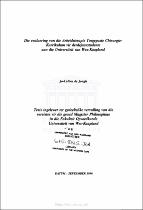| dc.description.abstract | This study arose from the work of Coetzee (1991), who attempted to formulate a set of philosophical or theoretical criteria in terms of which a curriculum (and, in that case, an Occupational Therapy curriculum) could be located. Coetzee's work produced a set of criteria in terms of which curriculum documents could be evaluated, and which she hoped could be useful for the development of guidelines for the reconstruction of the curriculum for the training of Occupational Therapists in South Africa. Coetzee's admission that such criteria would also need to be tested against the rigours of practice provided the spur for this study of the curriculum-in-action.
This study set out, accordingly, to track by means of an action research methodology, the teaching of an applied surgery course presented to third-year Occupational Therapy students at the University of the Western Cape in 1993. The teaching of the program, and the classroom dynamics, were monitored and documented, using a variety of data collection techniques. It was found that the course, probably in line with most of those taught in South African Occupational Therapy training programmes, followed an academic rationalistic approach, with an emphasis on the mastery of predetermined knowledge and its subsequent application in the practical or clinical situation.
It was found that the course, probably in line with most of those taught in South African Occupational Therapy training programmes, followed an academic rationalistic approach, with an emphasis on the mastery of predetermined knowledge and its subsequent application in the practical or clinical situation. It was also found that, although the Coetzee criteria were designed to deal with curriculum documents, they provided a useful framework against which to evaluate, and reflect upon, the curriculum as implemented.
The major conclusion to which this study comes is that, however useful a theoretical formulation of curriculum criteria might be, the likelihood that Occupational Therapy educators will reflect on and move to change their ways can be enhanced by their attempting to evaluate their own actual teaching in the university or clinical setting, and to do so by employing an action research methodology that also involves their students as commentators. | en_US |

